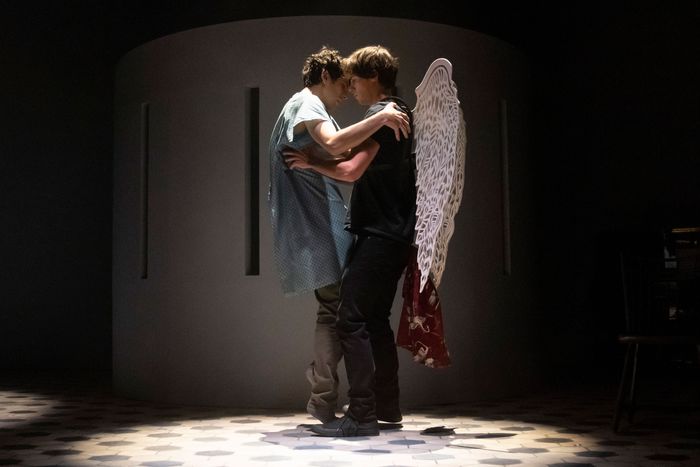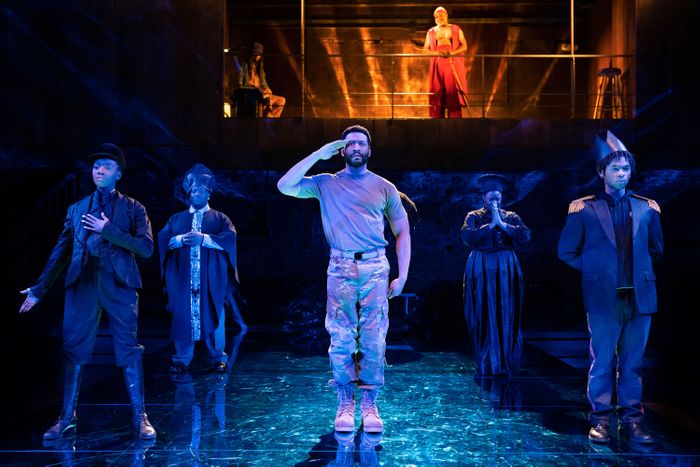
At the center of the stage during Letters From Max is a half-cylinder with vertical slits along the sides, an object that resembles something between the keep of a Gothic castle and a zoetrope through which you might watch an old bit of animation. The design, by Marsha Ginsberg, also has the feeling of an altar, which befits the play’s subtitle, a Ritual. This is where you’re going to watch a metaphorical sacrifice. Sarah Ruhl’s play dramatizes her friendship with the poet Max Ritvo, one of her students who died from cancer at age 25 in 2016. It gives you an extremely close perspective on the experience of knowing and then losing him, so much so that it may feel intrusive to be there.
The play is based on Ruhl and Ritvo’s correspondence, previously compiled in a book, in which the two are drawn toward each other’s affinity for language. The action begins with Ritvo’s application to Ruhl’s playwriting class at Yale, which is so charming that she admits him despite his inexperience (“Funny poets are my favorite type of human being,” she says). The two become close as teacher and student as Ruhl learns about Ritvo’s high-school experience with Ewing’s sarcoma. Then, as Ritvo moves on to other classes and graduation, she becomes more of a friend and adviser, coaching him about his career and relationships as well as checking in about his treatments when his illness returns.
Ruhl sticks closely to the actual text of their exchanges, as she did in Dear Elizabeth, adding some excerpts from Ritvo’s poetry (and a little of her own). This gives the play the advantage of verisimilitude — you witness their deftness with language while they’re riffing about the Amtrak quiet car via text message, for example — though it adds insularity. The drama occurs fully within their particular friendship, and it does capture the way a close written correspondence can feel as though it shuts out the rest of the world. But it also sets the audience outside that exchange, watching Ruhl and Ritvo bond without a sense of the world around them. You want another perspective, in the way that in geometry two points form a line but a third creates a plane — a disruption of the exchange from another student or professor or someone in Ritvo’s family or Ruhl’s.
Onstage, under Kate Whoriskey’s direction, Ruhl is played by Jessica Hecht with the actors Ben Edelman and Zane Pais alternating performances as Ritvo and a tertiary Tattoo Artist Angel figure who watches over the action and serves as a stage manager–waiter–medical technician and, indeed, a tattoo artist. (Ritvo got a new tattoo of a bird after each surgery.) Edelman, whom I saw as Ritvo, gave the poet the uncorralled energy of someone who can’t stop talking in a seminar but gets away with it because he makes such good points. Hecht is, as always, gifted at portraying winning awkwardness and brings a melancholy humor that leavens the story’s grimmer moments (especially her lilting way of pronouncing “soup”). It must be hard, however, to portray the playwright, and Ruhl the writer doesn’t have the clearest grasp of Ruhl the character. Intriguing bits of psychology are left unexplored in these exchanges, such as the elder character’s insecurity about her own poetic ambitions.
In watching this correspondence play out onstage, we develop a heightened awareness of each e-mail, text, or message as a performance, and this becomes revealing in its own right. The first exchange over Ritvo’s application is the beginning of a friendship but also a student angling to get into a competitive seminar. Later, there are compliments from Ruhl to Ritvo on his work and back, mutual commiseration about gossip and critics, and even the performance of trying to seem well while very sick, or portraying confidence in an afterlife when you’re nearly certain someone you know will die. A possessiveness is inherent in the project, even as it begins with Ritvo’s collaboration before his death, in bundling up all these bits of text to say, Here, this is the person I knew, as if that might create a complete picture. Watching it, I kept thinking back to a very brief interaction I had with Ritvo when I interviewed him for a piece about his college improv group, and I wondered, Is that exactly the person I’m seeing onstage? But here I am, staking my own little claim of insight with my own sliver of experience.
Ritual and repetition also pervade the experience of black odyssey, Marcus Gardley’s adaptation of the myth of Odysseus about a Black veteran making his way home from Afghanistan to Harlem. The play begins with a rhyming choral incantation at once grand and winking (“This part here is just … foreplay,” goes one line) that sets the tone. Gardley is both working on a mythic scale and sending it up. We’re thrown into a chess match between Deus (James T. Alfred) and Paw Sidin (Jimonn Cole), who are fighting over the fate of Ulysses (Sean Boyce Johnson). He has angered the god of the sea by killing one of his children, an innocent Afghan boy. As Ulysses travels across the sea and encounters the likes of the sirens (styled as Diana Ross, Tina Turner, and James Brown), his wife, Nella P. (D. Woods), waits for him back home and tries to manage their headstrong son, Malachai (Marcus Gladney Jr.).
If Letters From Max works too much in miniature, black odyssey has an impulse toward overexpansiveness. Gardley wants to fit nearly everything into his big mythological universe, from the riots after the assassination of Martin Luther King Jr. to the history of slavery in America (Deus and Paw Sidin’s chess game has been going on since 1619). It doesn’t all map easily onto The Odyssey. Stevie Walker-Webb, who recently directed Ain’t No Mo’ on Broadway, helps push things toward humor and wildness, as when Ulysses encounters a version of Circe (Adrienne C. Moore) who is dressed partially as Harriet Tubman and partially as an MTA employee (the inventive costumes are by Kindall Houston Almond), though when the play turns toward serious matters it grows plodding. As in any version of The Odyssey, the story is more gripping when Ulysses is off in the wilderness, less so when he’s reinstating his duty as a father and righting house and home. In any telling, he is meant to want to stop wandering, but the wandering is always the fun part.
Letters From Max is at the Signature Theatre through March 19.
black odyssey is at Classic Stage Company through March 26.



